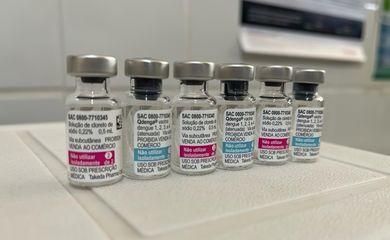Researchers to apply for registration of new dengue jab by July

Since 2009, researchers at Brazil’s Butantan Institute have been studying the production of a new dengue vaccine. The inoculation is currently in its final phase of clinical trials—in June, the last volunteer patient to receive the experimental dose concludes their five-year follow-up. The institute expects the application for registration to be submitted to the country’s national drug watchdog Anvisa for analysis between June and July.

The largest producer of vaccines and serums in Latin America and the top producer of immunobiologicals in Brazil, Butantan Institute is responsible for most of the serums used in the country against venomous animals, bacterial toxins and the rabies virus. It is also responsible for a large volume of national vaccine production—it produces, for example, all the doses against the influenza virus used in the national vaccination campaign against flu.
Classified by the institute as a public health problem in Brazil, dengue fever has a total of four serotypes. Type 3, which hasn’t circulated as an epidemic in the country for over 15 years, has started to show cases again. People who catch dengue once can therefore be reinfected by another serotype. When this happens, the condition can evolve into what is popularly known severe dengue, with an increased risk of death for the patient.
A single dose for four types
The vaccine being developed by the institute, like Qdenga, from the Japanese laboratory Takeda, contains the four types of attenuated virus. “Because they are weakened, the attenuated viruses induce the production of antibodies without causing the disease, and with few adverse reactions,” the institute reported. The Brazilian shot, however, has a distinctive feature: it will be administered in a single dose, whereas Qdenga requires two doses.
Production
The path to producing the vaccine includes the following steps: the attenuated virus is cultivated in Vero cells from the African green monkey, a technique reported to be widely known and studied by science; the material is purified and sent for formulation; then freeze-drying is carried out, a process that transforms the liquid into powder; finally, the diluent is created, to be added to the powder when the vaccine is administered.
In the case of the institute’s dengue vaccine, the dose is manufactured in partnership with the American National Institute of Health and the pharmaceutical company MSD. The clinical trials are currently in phase 3. The vaccine has been administered to over 16 thousand people and the team is currently monitoring the last volunteers included. Here are the results:
- Phase 1 of the clinical trial: 100 percent antibody generation in people who had already had dengue, and 90 percent antibody generation in individuals who had never had contact with the virus.
- Phase 2 of the clinical trial (volunteers received two doses): 100 percent seroconversion rate after the first dose in people who had already had dengue and 92.6 percent seroconversion rate in individuals who had never been infected. Eighty percent of the volunteers produced antibodies against the four serotypes.
- Phase 3 of the clinical trial (primary data): 79.6 percent overall efficacy, 89.2 percent efficacy in those who had already contracted dengue, and 73.5 percent efficacy in those who had never had contact with the virus.
“Of the more than 10 thousand people who received the inoculation in phase 3, only three (less than 0.1 percent) had serious adverse events, and all recovered fully. The frequency of adverse events was similar among the three age groups (2–6, 7–17, and 18–59 years old),” the institute declared.
National drug authority Anvisa
Anvisa said it had already met with Butantan Institute to discuss the dengue vaccine being developed by the laboratory. The current phase 3 of clinical research is classified by the agency as an “essential stage” to scientifically determine the safety and efficacy profile of the dose.
“During the meeting, the Butantan team presented some preliminary data from the clinical study, which is still underway. As the clinical study progresses, new data and complementary information may be presented by the institute for discussion with Anvisa, with a view to future approval of the vaccine, if the clinical results can prove its safety and efficacy.”
Cases
In the first weeks of 2024, Brazil recorded a total of 243,721 probable cases of dengue fever. There are still 24 confirmed deaths and 163 under investigation. Based on the figures, the incidence of dengue in the country is 120 cases per 100 thousand people.
In the previous report, the country recorded 15 deaths and 217,841 probable cases of the disease. There were still 149 deaths under investigation.





